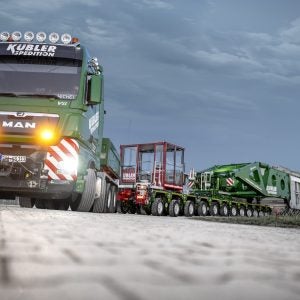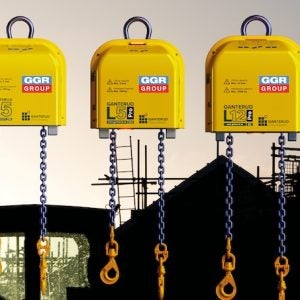It still seems rather a novelty seeing cranes 'in the metal' again following Covid but there really is no better way to appreciate the amazing engineering of these incredible machines. With Bauma just over four months away seeing new cranes firsthand again has given me an 'appetite for construction' that only gleaming new metal and a large Hofbräu can slake.
One thing that was evident at Vertikal Days was the increasing number of electric cranes and a corresponding increase in battery-related companies. The increasing use of battery power is an area which features writer Julian Champkin explores in greater depth in the battery technology feature on page 29. He looks at how this fast-changing sector is evolving and also at some of the latest electric cranes on the market.
We also bring you news this month that Mammoet has successfully carried out what it calls the world's first electrically powered heavy transport (full story page 13). It moved a production vessel at a chemical plant in The Netherlands using Scheuerle SPMTs driven by an electric power pack unit (ePPU) – in effect a giant battery.
These developments are notable because until now generating the kind of forces required for large crawler cranes to lift, or SPMTs to move, heavy items has not been possible. Battery technology has finally caught up with the vision, though, and a brave new (greener) world awaits.
With Mammoet's heavy transport, the ePPU also acted as a counterweight to balance the vessel as it was transported. The possible use of batteries in this way is also noted by Dan Hunt, executive sales manager for Shield Batteries, who says that although lead batteries are heavy, "that is an advantage in cranes because you can use it as counterweight; why carry lumps of concrete around when you can carry your power source instead?"
It is with regards to the issue of battery ownership, though, that we might see some of the biggest changes. Orlando de Jonge, sales manager at Netherlands-based PV-E Crane, believes that crane operators will not want the extra complication of owning or maintaining batteries, or ensuring that they are the latest, most efficient models, so battery rental companies will emerge that come to the site, slot in a fresh set of charged batteries whenever required, and take away the flat ones for recharging. "Probably the rental companies rather than the crane operators will actually own the batteries," he says. "For the operators it will be pay-as-you- go. That will save them a lot in capital investment because batteries are expensive. It will be cheaper if they buy the crane without batteries which they rent as required."
For big changes like this to happen, though, de Jonge urges for a change in thinking across the industry. “No single contractor can do this alone," he says. "It needs an infrastructure, and it needs an industry-wide mindset. Developers, manufacturers, contractors all have to be on board. Big hire companies will probably do it first, and then smaller ones will be able to follow."
With manufacturers fast developing new electric cranes and heavy transport solutions, plus contractors such as the UK's Select Plant Hire and Mammoet already reaping benefits, it seems the future has arrived.
Christian Shelton, Editor
Christian.Shelton@progressivemediainternational.com






